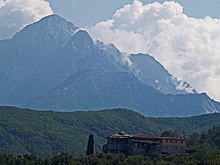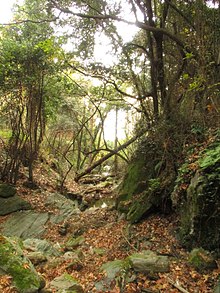Mount Athos
Appearance

Mount Athos is a mountain and peninsula in northeastern Greece and an important centre of Eastern Orthodox monasticism. It is governed as an autonomous polity within the Hellenic Republic, namely the monastic community of Mount Athos under the direct jurisdiction of the Ecumenical Patriarch of Constantinople.
Quotes
[edit]- Given all the ways – both explicit and subtle – in which hesychasm is profoundly embroidered into the fabric of contemporary monasticism at the Holy Mountain, it is thus justified to conclude that not only is hesychasm Athonite, but Athos too is fundamentally hesychast.
- Dorobantu, Marius (2022). Hesychasm at the Holy Mountain: Athos is Hesychast and Hesychasm is Athonite. Routledge Handbook of Mount Athos. London: Routledge.
- This stillness, this silence, is everywhere, pervades, all, is the very essence of the Holy Mountain. ... But this stillness, this silence, is far more than a mere absence of sound. It has a positive quality, a quality of fullness, of plenitude, of the eternal Peace which is there reflected in the veil of the Mother of God, enshrouding and protecting her Holy Mountain, offering inner silence, peace of heart, to those who dwell there and to those who come with openness of heart to seek this blessing.
- Palmer, G. E. H. "Silence over Athos." First published in the periodical Orthodox Life (Holy Trinity Russian Orthodox Monastery, Jordanville, NY) Nov.-Dec. 1968, p.33. Also quoted in: Ware, Kallistos. “Two British Pilgrims to the Holy Mountain: Gerald Palmer and Philip Sherrard.” In The Monastic Magnet: Roads to and from Mount Athos, edited by René Gothóni and Graham Speake, 143–57. Oxford: Peter Lang. (pp. 150–51)
Nature
[edit]
- Here every stone breathes prayers.
- Nikon of Karoulia. Quoted in: Speake, Graham; Ware, Kallistos (2012). Mount Athos: Microcosm of the Christian East. Oxford: Lang, Peter, AG, Internationaler Verlag der Wissenschaften. ISBN 978-3-0353-0233-2. (p. 180)
- There came to my mind an Athonite anecdote, typical of the monastic sense of humour, about an elder who was celebrating the pre-dawn service with his disciples. Disturbed by the noise of the nearby frogs, he went out of the chapel to remonstrate. ‘Frogs,’ he said, ‘we’ve just completed the Midnight Office and are starting Matins: would you mind keeping quiet until we’ve finished.’ Whereupon the frogs replied, ‘We’ve just completed Matins and are starting the First Hour: would you mind keeping quiet until we’ve finished.’
- Kallistos Ware. Quoted in: Speake, Graham; Ware, Kallistos (2012). Mount Athos: Microcosm of the Christian East. Oxford: Lang, Peter, AG, Internationaler Verlag der Wissenschaften. ISBN 978-3-0353-0233-2. (p. 178)
- I have never actually seen wolves on Mount Athos, although in the past I have noted what I took to be their footprints in the sandy paths not far from the northern frontier of the monastic territory. No doubt they were observing me from the undergrowth nearby. The presence of wolves on the Mountain, at least as recently as the 1970s, always struck me as a reassuring sign. For wolves in their own way are hesychasts, who dislike disturbance and noisy intrusion from human beings. So long as they continued to make their home on Athos, this was an indication that the Mountain remained still a place of silence and seclusion. Their disappearance troubles me.
- Kallistos Ware. Quoted in: Speake, Graham; Ware, Kallistos (2012). Mount Athos: Microcosm of the Christian East. Oxford: Lang, Peter, AG, Internationaler Verlag der Wissenschaften. ISBN 978-3-0353-0233-2. (p. 177)
Asceticism
[edit]- Peut-être les moines qu’on appelle « gyrovagues » exaltaient-ils particulièrement notre condition d’étranger éternel : marchant sans cesse de monastère en monastère, sans être fixé – ils n’ont pas tous disparu ; il en reste, paraît-il, quelques-uns encore sur le mont Athos : ils marchent leur vie durant sur les sentiers étroits des montagnes, tournant en rond, s’endormant à la chute du jour dans l’endroit où leurs pieds les a portés ; ils passent leur vie à marmonner des prières en marchant tout le jour, sans destination ni but, ici ou là, au hasard du croisement des sentiers, à tourner, retourner, ils marchent sans aller nulle part, illustrant par l’éternel cheminement leur état d’étrangers définitifs au monde d’ici-bas.
- Perhaps the itinerant monks called ‘Gyrovagues’ were especially responsible for promoting this view of our condition as eternal strangers. They journeyed ceaselessly from monastery to monastery, without fixed abode, and they haven’t quite disappeared, even today: it seems there are still a handful tramping Mount Athos. They walk for their entire lives on narrow mountain paths, back and forth on a long repeated round, sleeping at nightfall wherever their feet have taken them; they spend their lives murmuring prayers on foot, walk all day without destination or goal, this way or that, taking branching paths at random, turning, returning, without going anywhere, illustrating through endless wandering their condition as permanent strangers in this profane world.
- Frédéric Gros. Quoted in: Gros, Frédéric; Howe, John (trans.). 2014. A philosophy of walking. London; New York: Verso. ISBN 978-1-78168-270-8.
- Perhaps the itinerant monks called ‘Gyrovagues’ were especially responsible for promoting this view of our condition as eternal strangers. They journeyed ceaselessly from monastery to monastery, without fixed abode, and they haven’t quite disappeared, even today: it seems there are still a handful tramping Mount Athos. They walk for their entire lives on narrow mountain paths, back and forth on a long repeated round, sleeping at nightfall wherever their feet have taken them; they spend their lives murmuring prayers on foot, walk all day without destination or goal, this way or that, taking branching paths at random, turning, returning, without going anywhere, illustrating through endless wandering their condition as permanent strangers in this profane world.


